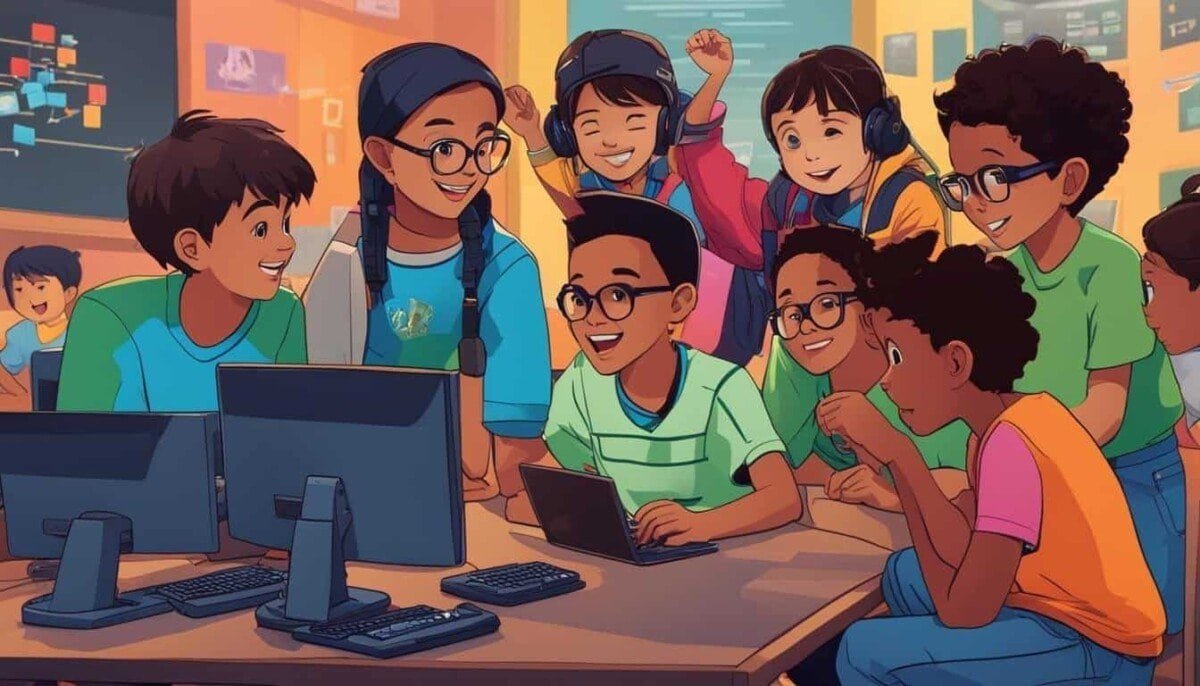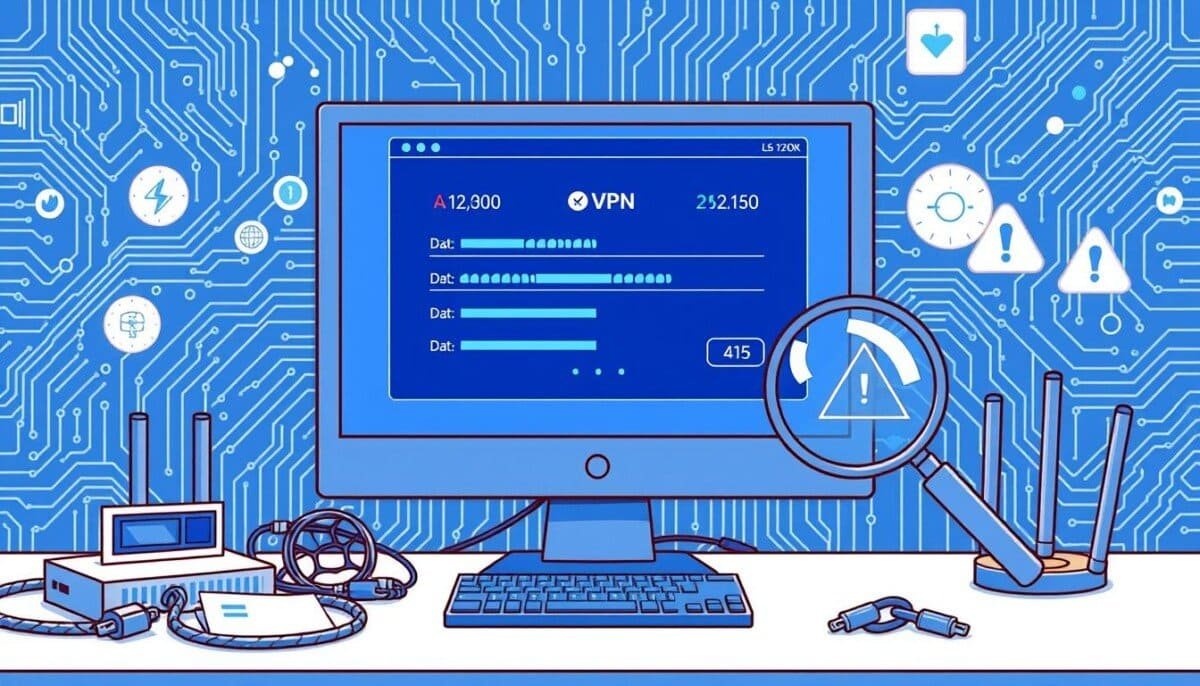Can kids really learn to hack in a safe way? And how can parents make sure their kids’ tech curiosity is guided right? It’s all about guiding them ethically and keeping things secure.
In our digital world, the idea of kids learning to hack might worry some. Yet, it’s all about gaining the right skills in a safe manner. This guide offers a fun and safe way for kids to learn about ethical hacking. By exploring ethical hacking and cybersecurity, we show kids how to use the digital world wisely. We inspire their love for tech. This guide goes over everything from what ethical hacking is to picking safe tools for kids.

Key Takeaways
- Understand what ethical hacking is and its importance for kids.
- Discover resources like PBS and the FBI’s Safe Online Surfing for cybersecurity education.
- Learn how to introduce computer programming to your child.
- Explore fun and educational hacking games like Google’s Interland.
- Recognize the benefits of ethical hacking skills for problem-solving and career opportunities.
Introduction to Ethical Hacking for Kids
Teaching kids about ethical hacking basics helps them understand the digital world. It’s for kids 12-15 years old. They learn the difference between good (‘white hat’) and bad (‘black hat’) hackers. Ethical hacking protects computer systems and data.
Cybersecurity fundamentals need white hat hackers. They find and fix security problems. The world needs more ethical hackers. Kids learning this can help fill that need. They learn to be responsible digital citizens.
Courses teach kids about coding, viruses, and keeping data safe. They last around 8 hours. Kids learn important cybersecurity skills.
There are stories of young kids finding security flaws. Like a 9-year-old who found a security gap. These stories show why we need safe hacking for kids. Fun learning methods help kids remember better.
Israel includes cybersecurity in school. Other places are starting to do the same. Groups like ISC2 offer free cybersecurity training. Ethical hacking is now a key skill for our kids’ future.
Resources for Teaching Kids Cybersecurity
Talking to kids about cybersecurity is very important today. Here are some great cybersecurity resources to help teach online safety education:
US Cyber Challenge’s Cyber Quests
The US Cyber Challenge has cyber quests. These are fun competitions that give hands-on cybersecurity experience. They help kids learn to think critically and gain important tech skills.
Public Broadcasting Service (PBS)
The Public Broadcasting Service has great content for kids. It includes quizzes and games that teach digital smarts. This makes learning online safety education fun and easy for kids.
FBI’s Safe Online Surfing
The FBI’s Safe Online Surfing (SOS) program teaches FBI online safety. Kids can play interactive games and take lessons. This helps them use the internet safely and protect their personal info.

- CyberPatriot: AFA’s program inspiring K-12 students in cybersecurity.
- National Cyber League: Offers a platform for learning and competitions.
- Hacker Highschool: Lessons on Attack Analysis and Defensive Hacking.
| Platform | Resource Type | Target Audience |
|---|---|---|
| Codecademy | Interactive Courses | All Ages |
| Cybrary | Online Courses | All Ages |
| GenCyber | Summer Camps | Students and Teachers |
| Capture the Flag (CTF) | Competitions | Students |
Starting cybersecurity education early is key. It teaches kids how to be safe online. These resources are great for that purpose.
How to Introduce Computer Programming to Your Child
Introducing computer programming to kids can be very rewarding. It helps them gain skills that are important in today’s world. By learning programming early, kids can do well in many areas of life. This is because STEM fields are growing fast and are very important.
Importance of Coding Skills
Learning to code is key for kids. It helps them with problem-solving, logical thinking, and being creative. The Bureau of Labor Statistics says STEM jobs will grow a lot from 2021 to 2031. This is double the rate of other jobs. For example, software developers will be needed a lot. They get paid well too, about $132,930 a year on average. This shows why it’s important to teach kids programming for their future careers.
Top Coding Platforms for Kids
It’s important for kids to learn programming on the right platforms. Here are some of the best ones:
| Platform | Description | Age Range |
|---|---|---|
| Scratch | Scratch is a block-based visual programming language developed by MIT Media Lab. It’s ideal for beginners as it allows children to create stories, games, and animations. | 5-16 |
| Code.org | Code.org offers interactive and engaging computer science tutorials that are simple for kids to understand. Children can work on projects aligned with their interests. | 5+ |
| Hacker Can | Hacker Can provides a game-based learning environment with 150 chapters, focusing on algorithms, problem-solving skills, and computational thinking. | 6-14 |
| Tynker | Tynker is a comprehensive platform that offers coding courses covering everything from block coding to text-based languages like Python, encouraging children to advance their skills progressively. | 5-17 |
Encouraging your child to use these platforms can really help them. They will get better at solving problems. Plus, they will be ready for the future. Kids can learn coding in schools or online. This helps them grow and develop well. Supporting your child as they learn to code is important for their success.
Parental Guidance and Online Safety
To keep kids safe online, parents must guide and watch over them. Around 72% of kids have met a cyber threat. Yet, only 39% talk to their parents about these dangers. With most children (94%) going online at home, parents should carefully monitor this activity.
Setting up parental controls is key. Many gadgets and apps have controls for time limits and blocking bad content. Checking game ratings and privacy settings helps avoid unwanted chats and content.

Talking about internet use and issues is vital. Such talks build trust and teach kids safe online habits. Sharing internet safety tips helps kids learn about keeping passwords secret and safe.
Antivirus software is also important for online safety. It should screen emails and fight malware. Keeping software up to date stops security risks. Automatic updates are great for kids who might forget to update things.
Make a safe web space by having separate accounts for kids. This limits what they can access. Secure apps can track where they are. But it’s important to talk about the dangers of sharing where you are online with them.
- Keep computers in open areas for easier monitoring of activities.
- Encourage family discussions about password security and creating strong, unique passwords.
- Set passwords on app store accounts to prevent unauthorized purchases.
- Choose devices with child-friendly content and tailored parental controls for safer online exploration.
Clear rules and close watch by parents help kids become good and safe internet users.
Fun and Educational Hacking Games for Kids
Games can make learning about tough subjects like cybersecurity fun for kids. We’ll look at cool *hacking games for kids* that make learning a blast.

Interland by Google
Google Interland helps kids learn about being safe online. They’ll play games that teach them how to create strong passwords, spot phishing, and value privacy. It’s a fun way to learn about staying safe on the internet.
Interland is made up of four amazing lands:
- Kind Kingdom: Kids learn about kindness and stopping online bullying.
- Reality River: It focuses on recognizing scams.
- Mindful Mountain: Kids learn to think before sharing online.
- Tower of Treasure: This part teaches about creating strong passwords.
Hak4Kidz Events
Educational hacking events by Hak4Kidz take place in different areas. They offer hands-on activities that teach kids about cybersecurity. Kids get to learn everything from coding basics to doing network security.
Hak4Kidz events are perfect for building critical thinking skills. Some of the main features include:
- Workshops on tools like VirtualBox and Kali Linux for learning.
- Kids show off their projects in a showcase.
- They get to meet cybersecurity experts for advice and tips.
These hacking games for kids and events like Hak4Kidz make learning fun. They help kids understand complicated things in an easy and exciting way.
Benefits of Ethical Hacking Skills in Kids
Ethical hacking teaches kids critical life skills like problem-solving and thinking deeply. These skills help them get ready for future jobs in the growing cybersecurity field. Learning about ethical hacking makes them responsible users of the internet.

Problem-Solving and Critical Thinking
Forbes says ethical hacking boosts problem-solving skills in kids. It also builds their critical thinking and ethics. By doing hacking exercises, kids learn to think clearly and make plans.
They learn to spot and fix complex coding problems. This is crucial for tech jobs they might do later.
The Journal of Educational Computing Research shows that cybersecurity lessons improve coding skills. They also enhance logical thinking and algorithmic reasoning. This helps in school now and in lifelong learning later.
Future Careers in Cybersecurity
Teaching kids about cybersecurity opens doors to a booming job market. The National Cybersecurity Alliance says this education prepares kids for future careers. It also teaches them how to keep themselves and others safe online. Cybersecurity Ventures says cybercrime will cost a lot of money by 2025. So, skilled pros are in high demand.
The Journal of Computers in Education finds teaching kids about ethical tech use prepares them to be good digital citizens. They learn to use coding for good. The International Journal of Computer Science and Information Security stresses teaching kids about ethics and digital care early on.
Here’s a simple list of skills and their benefits:
| Skill | Benefit |
|---|---|
| Problem-Solving | Encourages logical thinking and addresses complex issues systematically |
| Critical Thinking | Enhances decision-making and ethical judgment in digital contexts |
| Cybersecurity Knowledge | Prepares for future careers in a high-demand field |
| Digital Responsibility | Promotes the responsible utilization of technology |
Teaching your child about these ethical hacking benefits can lead them to a secure and bright future in cybersecurity. They also learn important life skills.
Real-World Examples of Safe Hacking Activities
Incorporating real-world hacking into teaching is key. It makes learning about tech safety fun for tech-wise kids. Hackathons are great for this. They promote creative thinking in spotting and fixing security problems.
Bug bounties are another cool tool. Companies like Microsoft have an event called the BlueHat convention. They challenge ethical hackers to find bugs in their systems. Successful bug hunters get rewards. In 2022, over $1 million was given out at one hack event. This approach boosts system security. Bug bounties not only enhance cybersecurity but also foster collaboration between companies and the hacker community. By integrating techniques like these into their overall strategies, businesses can align them with broader frameworks, including project management pricing models, to allocate budgets effectively. This ensures that resources are directed towards proactive problem-solving while also attracting top talent to identify and address vulnerabilities.
Teaching kids about Two Factor Authentication (2FA) is crucial too. Simple demos show why it’s important. Lessons on regular software updates and strong passwords also teach kids how to stay safe online.
Games and simulations can teach a lot. Phishing simulations help kids spot scams. Through encryption exercises, they learn to protect data. Games like scavenger hunts and Jeopardy make learning about digital safety fun. These methods improve critical thinking and team skills.
Having cybersecurity experts talk to kids is very beneficial. They can teach about the latest in cybersecurity. Students learn about data privacy and how to keep their online selves safe.
When students help create hacking challenges, they learn by doing. They work as a team to find and fix software bugs. These projects prepare them well for careers in cybersecurity. They also learn the importance of being ethical hackers.
These activities mix education with fun. They help build a safer digital world for us all.
Hacking for Kids: Safe Practices and Tools
Teaching kids about safe hacking is very important. We must give them secure tools and close watch. This makes their learning journey safe.
Understanding Ethical Boundaries
Talking to kids about hacking ethics is key. They must know what’s right and wrong in hacking. Google’s Be Internet Awesome teaches them to spot scams and deal with cyberbullying.
Using Secure Tools and Platforms
It’s vital to give children secure hacking tools. Programs like Create & Learn’s class teach them how to stay safe online. They learn about encryption and how to stop hackers.
Tools should follow the Children’s Online Privacy Protection Act (COPPA), especially for kids under 13. Such tools keep them safe. Also, teaching them to make strong passwords is crucial for security.
Parental Controls and Supervision
Parental supervision and control tools help keep young hackers safe. Being online together teaches them about internet safety. Talking about privacy policies at home makes a cyber-safe place.
Advice kids not to share too much info online. Teach them about phishing dangers. Tell them to use secure shopping sites and close accounts they’re not using.
| Safe Practices | Implementation |
|---|---|
| Teach Ethical Boundaries | Programs like Be Internet Awesome and COPPA guidelines |
| Use Secure Tools | Tools and classes like Create & Learn’s Cybersecurity Introduction |
| Parental Supervision | Spending time online together, using control tools, and educating about online privacy |
Conclusion
As we wrap up, it’s key to stress how vital it is to teach kids ethical hacking early. The future looks promising for young hackers, with a growing need for cybersecurity skills. By learning ethical hacking, kids get ready to better the world and keep the internet safe.
Cybersecurity jobs are set to soar by 28% in the coming years, showing the high demand for experts. These jobs pay well, offering a rewarding career path. Schools like Tulane University and the University of Cincinnati are pioneering in cybersecurity education. This helps prepare future ethical hackers and security pros.
It’s important to keep teaching and raising awareness about online safety. Certifications from the EC-Council mark important steps towards becoming a cybersecurity expert. Understanding hacker types helps guide our kids in a complex digital world.
To conclude, teaching kids cybersecurity offers tremendous benefits. Looking forward, supporting their learning is key to a safer online world. We must encourage both learning and ethical behavior to create a secure digital future for all.
FAQ
What is ethical hacking and how is it different from malicious hacking?
Ethical hacking, or white hat hacking, finds and fixes system weaknesses. This improves security. Malicious hacking, or black hat hacking, uses those weaknesses for personal gain or harm. Ethical hackers work to protect online spaces.
What resources are available to teach kids about cybersecurity?
Great resources for kids include the US Cyber Challenge’s Cyber Quests with fun competitions, Public Broadcasting Service’s digital literacy quizzes and games, and the FBI’s Safe Online Surfing (SOS) program with educational games for safety.
How can I introduce computer programming to my child?
Start by showing coding’s value in solving problems and thinking logically. Platforms like Scratch, Code.org, and Tynker make learning to program fun for kids.
What role do parents play in ensuring online safety for their children?
Parents set boundaries, monitor online activities, and help kids find safe, educational content. Using parental controls and discussing online safety are key to a safe digital space.
Are there any fun and educational hacking games for kids?
Yes, Google’s Interland teaches digital citizenship and safety with interactive gameplay. Hak4Kidz events offer cybersecurity challenges, teaching ethical hacking in a safe setting.
How do ethical hacking skills benefit kids?
Learning ethical hacking boosts problem-solving and critical thinking. It prepares kids for cybersecurity careers, needing pros to secure systems and tackle cyber threats.
Can you provide real-world examples of safe hacking activities?
Examples include ethical hackers finding and fixing vulnerabilities with organizations. This prevents cyber attacks, keeping digital infrastructure secure.
What safe practices and tools should kids use when learning to hack?
Kids should hack in secure environments, understanding ethical limits. They should use platforms like hackthebox.eu or overthewire.org, with parental supervision for safe learning.



